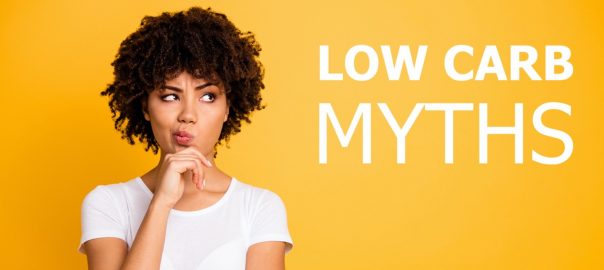
Debunking Low Carb Diet Myths
Myths About Low Carb Diets – Debunked!
Learn the truth behind common misconceptions about what it’s like to be on a low carb diet.
Disclaimer: The information in this article is not medical advice. A low carb diet may not be suitable for you. Consult your health care provider before making any changes to your lifestyle or use at your own risk.
Like any diet that becomes widely popular, myths start to circulate in social groups and in the media that throw off people’s perceptions about that diet and increase skepticism. The low carb diet is no exception to this, and that is why we are here to challenge some of the most common myths and answer your questions about the low carb diet. Whether you are considering a low carb diet for yourself or have heard some of these myths and want some clarification, keep reading.
Myth #1: The Low Carb Diet Is A Fad
Although the low carb diet and the ketogenic diet, in particular, have recently become very popular, they have been around for decades. The Atkins diet, introduced in 1972, emphasized eating a diet that is low in carbs and high in fat for weight loss. With widespread success, many people still follow the Atkins diet to this day.
Fad diets tend to promote dramatic, short-term weight loss. They are usually not healthy methods of dieting and don’t result in long-term weight loss or keeping the weight off. See our article, “Keto Pill Scams – Don’t Be Fooled” to learn more. In contrast, low carb diets aren’t always just about weight loss. Low carb diets are also advised for people coping with neurological diseases and metabolic conditions such as diabetes and prediabetes. An added benefit of low carb diets is that people tend to lose weight, although the main goal of choosing this type of diet can be health-related for some people. In addition, a low carb diet can teach people more disciplined eating, how to track macronutrients and make more informed choices about the food they consume, all of which can contribute to healthier habits that promote long-term weight loss and sustainable eating.
Myth #2: You Must Go into Ketosis
To achieve the fat-burning metabolic state known as ketosis, your body must produce a certain amount of ketones, which are an alternative fuel source to glucose. Ketones are naturally produced while we sleep, but in small amounts. You can also achieve ketosis by fasting for a certain amount of time, usually at least 12 hours. Ketones allow our bodies to continue functioning while we are not consuming food, and everyone produces them in some amount, not just those on a ketogenic diet. See our article on Alternate Day Fasting.
However, you can also consume a diet high in fat and low in carbohydrates to get into ketosis fast. In order to do this, one must consume less than 10% of their daily calories from carbohydrates, and the majority from fat. The benefits of being in ketosis include weight loss, lower blood sugar levels and reduced seizures in people with epilepsy.
With all of that said, many people still practice low carb diets without going into ketosis. This may involve eating between 15%-30% of your daily calories from carbohydrates. There are still lots of health benefits associated with these types of low carb eating, especially for those who are used to eating a diet that is normally very high in carbohydrates. A reduction from their regular consumption of carbohydrates can still lead to weight loss and improved blood sugar control. However, for certain medical conditions, achieving ketosis may be necessary.
Myth #3: Most of The Weight Lost is Water Weight
Within the first week or two of starting a low carb diet, many people lose a lot of water weight. This occurs because when we restrict our intake of carbohydrates, the body draws upon stores of glycogen (long chains of glucose molecules) in the muscles for energy. Glycogen tends to be stored along with water molecules, making it responsible for water retention. However, when glycogen stores are depleted, our water levels also fall.
But the weight loss doesn’t stop there. After the initial water weight is lost, the real weight loss can begin. Although this stage of weight loss will take longer and requires diet consistency, the weight lost during this time won’t be regained as easily. If you were to stop a low carb diet after losing just the water weight, you would likely gain it all back as you resume a moderate/high carb diet.
Myth #4: Low Carb Diets Are Bad for Heart Health
This myth is based on a misconception about low carb diets. Many people think that a low carb or ketogenic diets are synonymous with carnivorous diets and assume they can indulge in all of the meat, bacon and butter they want! Eating this way is not only the wrong way to approach a low carb diet but can also be quite dangerous for your health. So yes, if this is how you picture a low carb diet, then it’s terrible for your heart health.
However, a low carb diet done properly should only involve moderate and clean protein intake (20-40%). The rest of the diet should be focused around non-starchy vegetables and healthy fats. It is important to choose the right kind of fats on a low carb diet, because the wrong kinds can compromise heart heath. In particular, saturated fats from animal products (think butter, cheese and fatty cuts of meat) as well as refined vegetable oils (canola oil, sunflower oil, soybean oil and peanut oil) should be avoided on a low carb diet despite the fact that they are technically compliant. These types of fats have been shown to constrict blood vessels and arteries, and contribute to inflammation, all of which can increase your risk of heart disease. The saturated fats found in coconut oil, however, are a great choice for low carb cooking and will not compromise heart health. MCT oil (derived from coconuts) is also widely popular among low carb dieters, because it is quickly and easily converted into ketones to help you get into ketosis faster.
Myth #5: Low Carb Diets Limit Your Intake of Fibre
Building on our answer to the previous myth, a low carb diet should still leave room for lots of fibrous veggies! Some people may be confused about this, since fibre is a type of carbohydrate. However, fibre does not spike blood sugar levels nor cause fat storage. In fact, fibre actually helps regulate blood sugar levels and keeps us full, so we don’t overeat.
If you follow a low carb diet, you should be concerned with “net carbs”. These can be calculated by taking the total number of carbohydrates in a given food and subtracting the amount of fibre and sugar alcohols (also not processed by the body like sugar). The remaining amount of carbohydrates is the net carb amount. The net carbs should be comprised of sugars and starches, which do affect blood sugar levels and weight gain, and you should ideally limit these.
Myth #6: Your Brain Needs Carbs to Function
Normally, your brain functions by using glucose from the body, since it does not have its own fuel stores. That said, the brain is also capable of functioning while using ketones as energy. Certain parts of the brain cannot use any other fuel besides glucose; however, thanks to a process called gluconeogenesis, the liver can produce enough glucose from proteins and fats for these parts to function. This myth also rings false due to the fact that some people require a low carb diet in order for their brains to function normally, as in the case of epilepsy.
You might also be surprised to learn that many people actually report better cognitive function while in ketosis! Although at first, a sudden restriction of dietary carbohydrates can cause symptoms such as brain fog, headaches, sleep disturbances and fatigue, these usually clear up around the second week. Consuming a diet high in carbs and sugar causes the brain to become dependent on these “quick fixes.” Glucose is processed very rapidly by the body and the brain, meaning that near constant replenishment is required. In addition, when we consume things like sugar and carbohydrates, the reward centres of the brain are flooded with dopamine (the pleasure hormone) which leads to sugar addictions. As some of us may know all too well, when our blood sugar gets low, we can become quite irritable, tired, dizzy, nervous or anxious.
Breaking free from sugar addictions is one of the many benefits of a low carb diet that can affect our mental health. In addition, since ketones are not burned as quickly as glucose, they are a much more efficient fuel source for our brains. This can help stabilize hormones and neurotransmitter activity in the brain responsible for stress levels, appetite and our moods in general. People on low carb high fat diets also commonly report improvements in memory, mental clarity and concentration. Some studies have also shown that a ketogenic diet can help reduce inflammation which is important for reversing brain aging and psychiatric disorders.
Myth #7: Low Carb Diets Are Hard to Stick To
This one is completely subjective! While it is true that low carb diets may not be suitable for everyone, some people successfully follow these diets for months, years or even the majority of their lives (if medically necessary).
With that said, some things that might deter people from sticking to a low carb diet include:
- The Keto Flu.
Some people might not make it past the initial transition into ketosis or have a hard time restricting their carbs. This is not due to willpower, but rather the physiological changes (known as the “Keto Flu”) that come with restricting your carb intake which can be quite burdensome. Many people can suffer from headaches, cravings, nausea, sleeplessness, constipation, diarrhea and fatigue when they cut carbs suddenly.
One remedy for this is to reduce your carb intake more gradually until you reach your desired intake. This will make the symptoms less intense; however, they will persist longer. If you prefer to cut carbs all at once and face the Keto Flu head-on, just remember that there is a light at the end of the (approximately two week-long) tunnel!
- Tracking your macronutrients.
A low carb or ketogenic diet requires a lot of psychological adjustment as well. Not only do you need to educate yourself on what you can and can’t eat, but you will also find yourself obsessively writing down what you ate and calculating your macronutrients, at least until you get into the swing of things. Once you become more familiar with low carb or keto-friendly foods and recipes, it might be possible to carry on throughout your day without looking at diet tracker apps or busting out your meal journal. That said, you might require a quick calculation every now and then since we tend not to eat the same thing every single day.
- Restrictions.
As with any restrictive diet, it may not be ideal for some people to follow a low carb diet for a long time or consistently. One common issue is finding the right foods at restaurants, family gatherings or other social events. Although many restaurants offer low carb menu options these days or make it easy to make modifications, some people still like to enjoy themselves fully from time to time! And this is perfectly fine; no one is going to beat you up for having a cheat day.
- Cost.
While some people may prioritize their health at any cost, a low carb or ketogenic diet can get pretty pricey. Good quality cooking oils, fresh cuts of (preferably grass-fed) meat, cheeses, nuts and keto-friendly pantry products can come with higher price tags – especially when compared to refined, packaged and processed foods.
That said, there are some ways to save on low carb and keto-friendly foods. For example, you can buy produce when it’s in season, as prices tend to be cheaper and quality tends to be better! You can also ask your butcher or deli counter about the cheaper cuts of meat available (skip the Rib Eye steak). It may be helpful to buy produce and meat in bulk and freeze whatever you don’t use immediately. And finally, if it’s not in your budget, skip the fancy packaged low carb products and stick to whole foods and homemade goods.
Some things you shouldn’t cheap out on is buying Grass-Fed and Free-Range meat and meat by-products, as these are the healthiest and most sustainable choices. They tend to contain more omega-3 fatty acids and nutrients than the regular options and fewer harmful chemicals. The same goes for Organic produce, although not everything you buy has to be Organic. For example, fruits and vegetables that have outer peels are probably fine to purchase non-Organic. However, things like leafy greens and berries should be Organic as these foods tend to be the most contaminated with non-Organic farming practices. See our article, “Grain vs Grass Fed Beef – What’s the Difference?”
So… Are The Myths Debunked?
We’d like to say yes. But it’s really up to your discretion! Whether or not you have determined if a low carb diet is something you would like to try after reading this article, we hope that we have at least answered some of your burning questions and cleared up the most common misconceptions surrounding low carb diets. It is always important to do some research before starting a new diet or lifestyle change and to speak with your doctor to discuss any underlying health conditions that may affect your success on a low carb diet.
Stay Connected
We want to hear your thoughts! Share your experience with The Low Carb Grocery by leaving us a Google Review. Want to join the discussion? Follow us on Facebook and Instagram to join thousands of Canadians in the low carb and sugar free community. And be sure to subscribe to our online newsletter for weekly low carb sales and up-to-date information!






